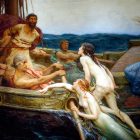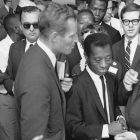Inferno: Reading Eileen Myles in Las Vegas
![Own work) [CC BY-SA 3.0 (http://creativecommons.org/licenses/by-sa/3.0)], via Wikimedia Commons Picture of the Tropicana Las Vegas building](https://blog.pshares.org/wp-content/uploads/sites/10/2016/05/inferno_tropicana.jpg)
Photo of Tropicana by Matthäus Wander (
I have a few hours to kill in Las Vegas and I’m looking for a quiet place to finish Eileen Myles’s Inferno. Reading here feels like a radical act; it doesn’t make anybody any money or provide a sense of spectacle. The Vegas Strip seems to discourage it. I finally find a relatively quiet place in the Tropicana: a long hallway just outside the convention center, windows on both sides, Sinatra on the PA, an occasional half-naked drunk person stumbling in from the pool. I sit in a red leather chair and open Inferno.
2
Some Mexican scout named Las Vegas “Las Vegas” when his trading party stopped here for water and rest on the way to Los Angeles. No casinos, no roads, no roller coasters, just artesian wells and patches of green in the scrub. It still feels like an oasis—the border between city and desert is very clear. My brother lives here, in the suburbs. Look out from his condo complex and you see empty office parks, built before the Great Recession and empty ever since. Past that, a fence. Past that, just dirt and rocks. The edge of the city.
3
My brother, who is also a writer, hates Las Vegas. He says there’s no culture here, no museums, no bookstores, no intellectual life outside of UNLV. It took him years, but eventually he found a group of like-minded writers, started a workshop group. I like the symmetry: Vegas is an oasis in a desert, a writing group is an oasis in life. My brother in an oasis in an oasis.
4
Eileen Myles is incredible at mixing particulars and abstractions in evocative ways. Near the end of Inferno, she describes a night out with poets at “the Orchidia, a Ukranian pizza joint with plastic vines crawling up the wood paneled walls. The lighting was tawny. I drank a very tall glass of beer. It was sweet beer. Suddenly everything seemed possible.” The Orchidia is no more, Myles tells us, but there’s a pizza named after it at a restaurant on Avenue A. “It has sun-dried tomatoes on it which didn’t even exist in 1976.” She follows this with the paragraph:
It’s easy to write an autobiography if the absence in the story is me. I remember applying to art school in 1967, staying up late, and I saw my reflection in the black glass of the night. When a window becomes a mirror. Who do I think I am sitting here now, deeper in that life.
The Orchidia’s plastic vines on wood paneled walls. Sun-dried tomatoes that didn’t exist in the seventies. Staring at her reflection, sinking deeper into her own life. When placed next to each other, these details become greater than themselves.
5
More machines in Las Vegas than people. A lot of people here, definitely, but they’re outnumbered by the slot machines, air conditioners, pinball machines, arcade machines, video poker machines, computerized craps machines, the cars that stream beneath the skyways over the Strip, the automatic card shufflers that rise up out of the Blackjack tables like missiles from their silos. If I were Eileen Myles, I could do something with this idea.
6
Inferno spends a lot of time building a sense of the New York poetry scene in the 70s and 80s, and I can’t decide if that bothers me or not. One one hand, it feels like Myles is straining to say “New York in the 70s and 80s was so cool and gritty and so authentic and everything happened there and Patti Smith and Kathy Acker were there and I was part of that too!” On the other hand, flagrant name-dropping and hipster detachment serve a purpose: they tell you who was there, how they talked and thought. What is a poetry scene if not gossipy and full of name-dropping? That’s authenticity.
7
Vegas almost manages to erase the concept of authenticity. After a while you stop wondering if those plants are native or if those rocks are real or just sculpted concrete. You assume everything is fake. Everything is there to inspire a feeling of Fun! There are homeless people holding signs asking for money, but you half expect them to jump up and start a flashmob. Vegas unsettles your sense of reality that way.
8
I finish Inferno in the hallway outside the Tropicana convention center and it leaves me feeling shimmery and full. I have a little bit of time before my flight, but not enough to take an Uber out to the suburbs and see my brother. I find a bar that serves good beer in the Monte Carlo and have a few pints by myself. The waitress is a chatty older woman named Dionesia who talks beer with me and encourages me to order samples of whatever I want. I’m happy to drink my tall, sweet beer and be alone.
Clearing the table next to me, Dionesia sees me taking notes in my notebook and asks if I’m keeping a diary:
“I kept a diary once, for years,” she says. “It kind of depressed me. I looked back a few years and thought, ‘Was this all I was doing?’ Then I’d skip ahead a year and read it and think ‘Oh my God,’ skip ahead another year, ‘This is just the same.’ And you know what? I took that diary and I tore it up. And then I changed my life.”



